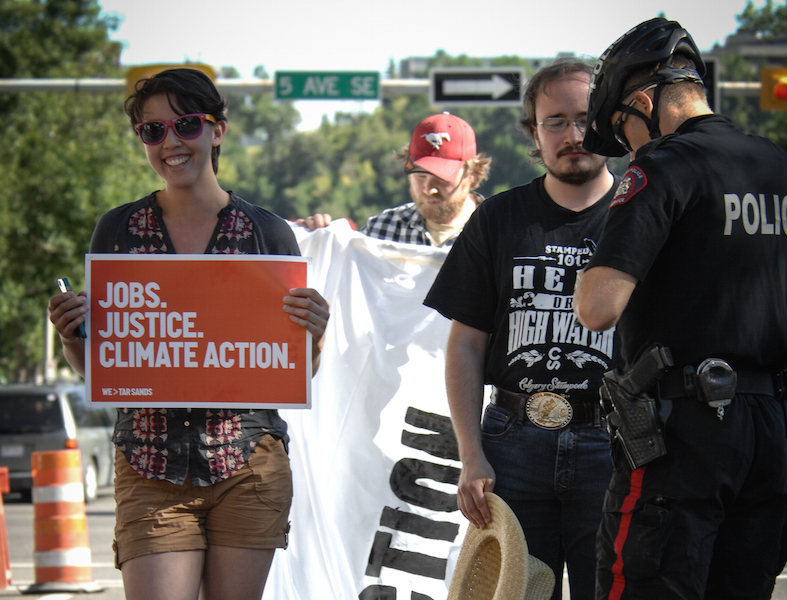rabble is expanding our Parliamentary Bureau and we need your help! Support us on Patreon today!
On Monday we launched into the second week of negotiations at COP21. It’s hard to believe the first week of the negotiations is already closed, and it has been a whirlwind week, indeed. This is Diane, Canadian Youth Delegation (CYD) team member and a representative for the Council of the Canadians, here in Paris for the COP21 United Nations climate negotiations. A lot has happened since my last blog post with my impressions from the first few days.
Wednesday saw many skip the COP conference grounds to attend a very inspiring event with Maude Barlow, Naomi Klein, Crystal Lameman and other notable speakers. It was an interactive panel that used the Leap Manifesto as a place to jump off talking about COP21, what our goals should be for the future, and how to get there from the grassroots. Avi Lewis began the talk by reminding us about some of the wins in our movement, including the fact that many pipeline projects have been cancelled, all of them are stalled, and that Exxon is under criminal investigation.
Naomi Klein underscored the importance of recognizing the intersectionality of fighting for climate justice, saying “there is not only a climate crisis, but a profound inequality crisis.” Most of the speakers talked about frontline and affected communities: indigenous communities, communities of colour, women, and people experiencing poverty — how these people are the most affected by climate change, and are also the best positioned to be leaders in finding solutions.
Maude Barlow unpacked the “real agenda” behind international negotiations like COP21, reminding the audience that though people with power say nice words, real-world macroeconomic policies that support economic globalization endanger our lands, waters, air, and communities. Through trade mechanisms such as ISDS (Investor State Dispute Settlement) Canada is already being sued by “investors” from other countries such as China and the USA, and that we risk paying billions of dollars to corporations to even begin the process of reducing emissions and protecting our environment and communities. She expressed her concern that the negotiations “will be based on a market based economy, financialization of nature, carbon trading, and even water pollution trading which has entered the lexicon.” She ended by talking about the Leap Manifesto, and how the Council of Canadians chapters have been studying and incorporating the document into our work across the country and around the world.
The event concluded with wonderful statements and questions from the audience. The most heartening thing was to hear people from other countries expressing interest in adopting the Leap Manifesto, created and supported by progressive leaders in Canada.
Thursday was a full day of action for the CYD. We organized an action inside the conference centre with the message that “youth want to be heard, not just seen.” We used this platform to highlight our demands to the Canadian government, including implementing UNDRIP, paying our fair share, zero emissions by 2015, stopping fossil fuel subsidies, and rejecting false solutions. We are adamant that our voices must be listened to — these are the solutions we wish to see in the future, which as youth we have a very big stake in. Our message was successfully amplified by the media, making it into the National on Friday night. Team members also jumped onto supporting a protest to “kick big polluters out” of the negotiations, led by Corporate Accountability International. This was a call that recognized the disproportionate influence energy companies have in COP21, and how their interests do not reflect the interest of the common good or the public.
On Friday, the CYD focussed on supporting rights-based language in the main negotiating text — particularly Article 2 of the “ADP.” We bore witness to the deletion of Indigenous rights and rights of occupied peoples within the agreement. It is true and frustrating that negotiators will spend hours debating grammar. Team members have expressed the strangeness of the transactional and cold environment that does not reflect the urgency or emotional and personal nature of the problem we are dealing with. Some of the CYD team attempted to attend a “toxic tour” event at the Solutions 21 conference, but were unable to get into the Grande Palais. The activists from this event voiced their disagreement with the false solutions presented (such as fracking), as well as the heavy emphasis on corporate participation in COP21. Many of the corporations involved with the Solutions 21 event are those creating emissions and pollutions problems in the first place. Friday also kicked off the Tribunal for the Rights of Nature — attended by Maude Barlow, who spoke on the rights of water.
Over the weekend the CYD offered our hands to help representatives of Indigenous peoples from around the world stage a powerful event on a waterway in the city. Chief Raoni of the Kayapo (in Brazil’s Amazon) opened the event, along with a strong delegation of the Lummi people from Turtle Island’ (North America’s) North West, and two other elders from different parts of the world. Indigenous peoples stood shoulder to shoulder on a bridge, holding banners saying things like “Defend the Sacred, Protect the Water” and anti-REDD messaging (the carbon trading mechanism that affects indigenous peoples who live in or near forests). While the banners dropped from the bridge, a floatilla of kayaks and canoes passed underneath, forming a powerful scene.
On Monday, we launched into the final week of negotiations — I will be working from inside the conference centre now, trying to impact the text and pressure negotiators. Watch for our daily blog, the CYDaily, and interact with us on social to raise awareness about the things we are seeing and hearing.
Salut from COP21!
rabble is expanding our Parliamentary Bureau and we need your help! Support us on Patreon today!




